The best IaaS
We feature the best IaaS (Infrastructure as a Service) providers, who can offer simple cost-effective solutions to virtual IT infrastructure, helping you move your servers to the cloud

The best Infrastructure as a Service (IaaS) providers can offer simple cost-effective solutions to virtual IT infrastructure, helping you move your servers to the cloud.
The best IaaS providers
Click the links below to go to the provider's website:
IaaS promises not just ease and convenience, but also a service provision at a much lower cost than investing up front in expensive on-premises hardware.
As a cloud service it offers a number of additional benefits when it comes to cloud computing and cloud storage, not least that it's a scalable solution meaning you don't have to worry about resources limits, and additionally you pay only for what you use as opposed to paying extra for physical services to provide redundancy if needed.
It's also much easier to work with when it comes to your IT infrastructure management as you won't need to monitor, maintain, or update servers on an individual basis, but instead simply manage your resources from a centralized platform.
Not only does this make it simpler and easier to use, it also means there are a range of data reporting and analytics options so you can drill down for business intelligence on almost every aspect of your business, from efficiency insights to productivity development.
Closely related to SaaS and PaaS, IaaS can offer solid opportunities for business expansion. Here we'll feature the best IaaS providers.
The best IAAS deals
Inmotion Hosting
Flex Metal Cloud by InMotion Hosting is the first On-Demand Private Cloud IaaS platform powered by OpenStack. Sign for a free Flex Metal Cloud Account, get access to Free Timed Trials of the platform and free credits available on request.
iDrive Compute
Exclusive: This cheapest VPS starts from under £1 a month
Save an incredible 90% on yearly plans, starting from one CPU core with 1GB of RAM, 40GB NVMe disk capacity (SSD) and 1TB bandwidth transfer. Note that the offer is applicable for the first year only. For subsequent years, normal charges are applicable.
The best IaaS providers available
1. Amazon Web Services
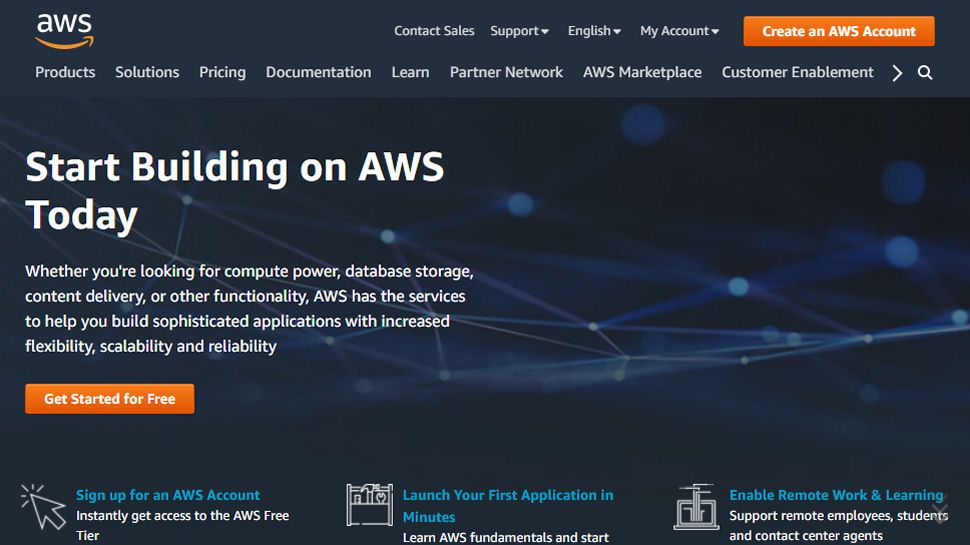
Highly-customisable services offered by one of the tech giants
REASONS TO BUY
- Most popular provider
- Very customisable
- Generous free tier
REASONS TO AVOID
- Steep learning curve
Amazon Web Services is a cloud-based program for building business solutions using integrated web services. While AWS offers much more, it is considered an IaaS solution as it supplies the hardware infrastructure that allows businesses to build their web-based solutions in the Cloud rather than physically in their premises.
Amazon Web Services is broken into four key areas: Compute, Storage and Content Delivery and Networking. As AWS offers an extensive array of admin controls via their secure Web client, these can all be controlled by you. From here clients also have access to auditing, encryption key creation, monitoring and logging among others.
AWS will manage all the hardware and system administration. Your infrastructure requirements can be increased or reduced as much as you like. This reduces the resources required to having this occur on site.
Under the ‘Computing’ section AWS offers access to EC2 (Amazon Elastic Computer Cloud) web services. This gives you to have control over your online computing resources as well as enabling you to run and acquire servers if needs be.
AWS has three different pricing models; ‘Pay as you Go’, ‘Save when you reserve’ and ‘Pay less using more’. To get prices for all these you need to contact sales directly.
However, AWS does offer a free tier. This offers users certain services for 12-months and after that you have to choose to sign up for any of the plans above or to cancel your AWS subscription.
2. Microsoft Azure
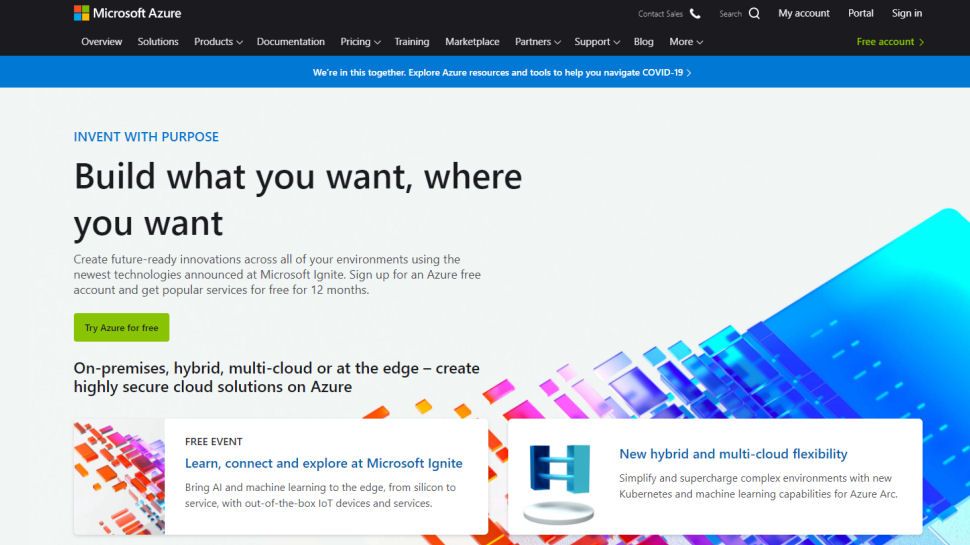
A stunning range of services, with some free features
REASONS TO BUY
- Free tier
- Linux-friendly
REASONS TO AVOID
- Some setup issues
Microsoft Azure not only offers Infrastructure as a Service but also Software as a Service and Platform as a Service. With Azure, clients can use the services purely on the cloud or it can be combined with any existing applications, data center or infrastructure you may already have in place.
Microsoft Azure can be used to deploy a wide variety of provisioned and managed infrastructures using its IaaS solution. It can fit any of your business needs such as storage, networking, and web hosting. The utility fully manages all of your infrastructure.
The platform gives you the freedom to move away from having your servers based on premises which can reduce costs. This removes the need for an on-site support team as this is all now looked after by Microsoft Azure.
The most surprising aspect of Microsoft Azure is how friendly it is to Linux users. While the framework is Windows, many Linux distributions can be run on it.
The platform offers a 12-month free tier that comes with access to all popular services, a substantial credit and over 25 ‘Always Free’ services. If this does not suit your needs Azure has all their prices laid out in incredible detail on their website. They also offer a cost calculator and a ‘Pay as you go’ service. Each price can be customised to your needs. However, the price will increase if you require more add-ons.
3. Google Cloud
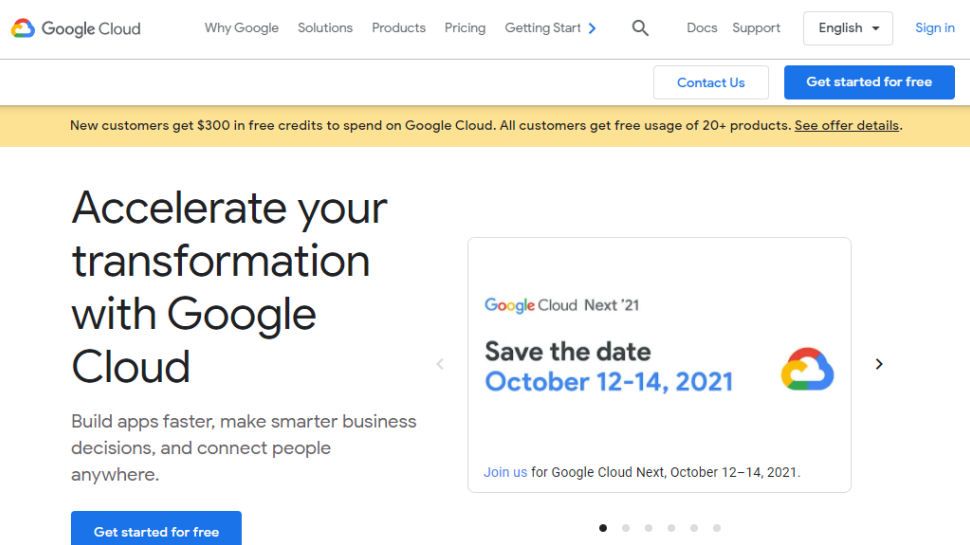
Elastic and affordable cloud infrastructure from the gurus of Google
REASONS TO BUY
- User-friendly
- 12-month free trial
REASONS TO AVOID
- Setup can be tricky
Google Cloud is a suite of cloud computing services that is run on the same infrastructure used by Google internally for its end-user products. It provides Infrastructure as a Service, Platform as a Service and Serverless Computing.
Google Cloud Platform enables users to create business solutions using Google-provided, modular web services. While the platform is an IaaS, it also comes with a managed platform and pre-built web services utilities.
With Google Cloud Platform you can use Google’s web services to build a highly-customised solution to meet all your company’s needs.
The platform makes sophisticated networking look easy. With Google Cloud Platform, it is quite straightforward to create a virtual network. This would include private and public subnets upon which to arrange your virtual machines.
As Google Cloud Platform relies heavily on Linux, it helps to be familiar with the Linux command line. This will make the process of setting up firewalls, gateways and routers much smoother.
Google advertises no upfront costs to start, with pay-as-you-go billing for the services you do use. Google also states that it do not charge termination fees.
4. IBM Cloud
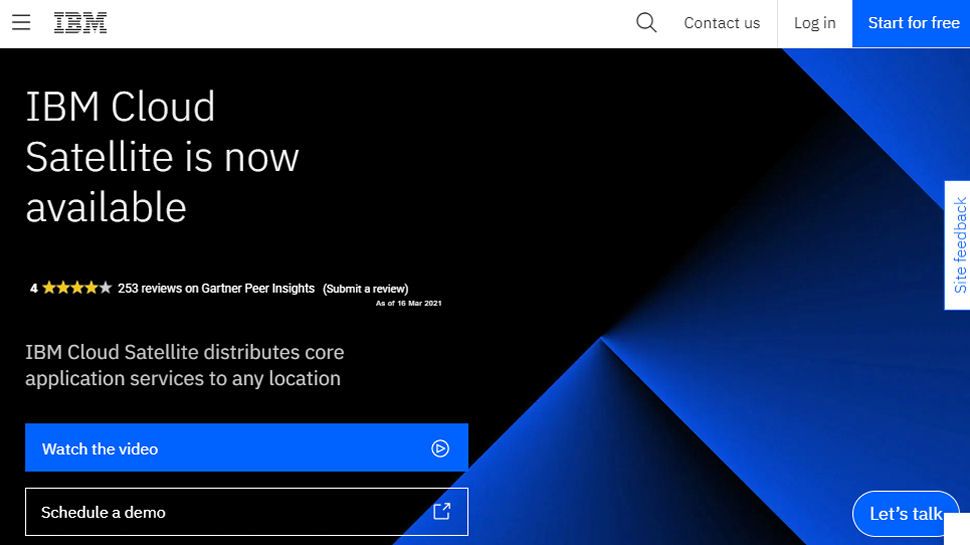
Reasonable priced bespoke IaaS from an industry titan
REASONS TO BUY
- Single occupancy servers
- Free tier
REASONS TO AVOID
- Some loading issues
IBM Cloud (formerly known as IBM SoftLayer) does not offer just IaaS, but a wide range of services and not all of them are cloud based either. It covers both virtual and hardware –based servers, composed of public, private and management networks.
As hardware and virtual-based servers are combined into one on demand cloud-platform, you have complete infrastructure control. IBM refer to their hardware servers as ‘bare metal’. These provide clients with sole access to their entire server. This reduces the ‘noisy neighbor’ effect and greatly improves performance.
IBM Cloud is integrated and managed by a single system that can be controlled via web portal, API (Application Programming Interface) or mobile apps.
The solution also offers full server customisation. This means that everything that is included in the server is handpicked by you. This way you do not have to pay for features that you might never use.
IBM Cloud offers a ‘Lite’ tier. This has no time limit, will not ask for credit card details and includes 256MB of Cloud Foundry Memory. After this you have the option of the ‘Pay as you Go’ Tier where you only pay for what you use. The website has a calculator which you can use to estimate costs. If neither of these are suitable, you can contact IBM for a subscription package tailored to suit your needs.
5. Oracle Cloud Infrastructure
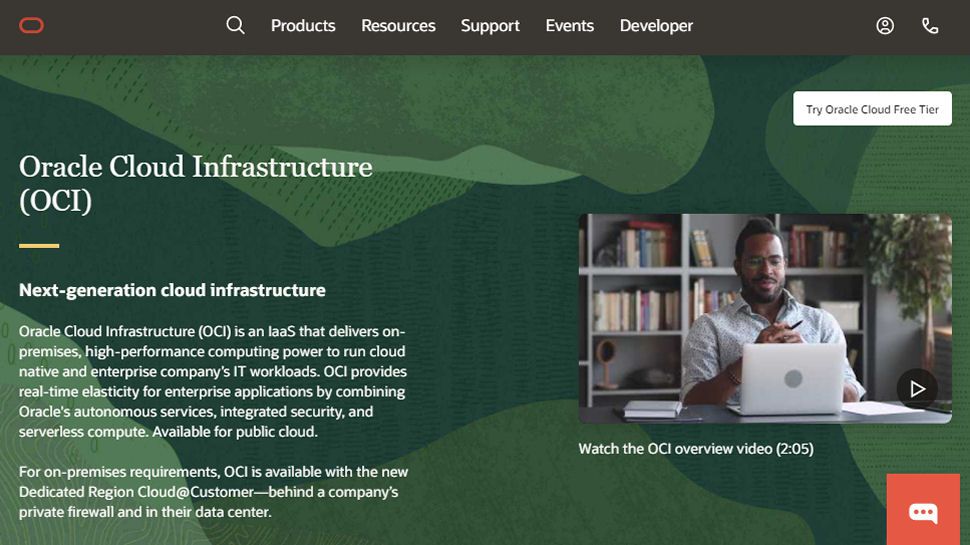
Oracle's cloud platform for IaaS
REASONS TO BUY
- Good range of features
- Network and edge services
- Lifecycle management
REASONS TO AVOID
- None
Oracle Cloud Infrastructure is the other big provider for IaaS, offering a good range of cloud services including computing, storage, database management, as well as a platform for application development and for big data analytics.
Oracle Cloud Infrastructure offers a good range of network, connectivity, and edge services, that allow you to have complete control of your own private cloud network. There are also strong features for identity management, compliance, and security also in place.
There is also an API lifecycle management solution to support agile development, as well as digital transformation.
The SOA Cloud Service is specifically developed for integrating your cloud services platform, and there are a mix of enhancement features such as AI, machine learning, as well as a digital assistant, plus the ability to adopt blockchain services as required.
Also consider these IaaS solutions
We've covered some of the major players above, but there are many more. Verizon, AT&T, Citrix, VMware, and other major IT companies can be expected to offer some form of IaaS platform for prospective customers. However, we're going to widen this feature to cover some of the best of the rest that you might not have normally considered, but are definitely worth taking a look at:
Digital Ocean has a simple but powerful set of features for deploying your own cloud. Referred to as "droplets" these are effectively network clusters that you can build and scale up for the applications you need to run, whether hosted services to CI/CD, through to AI and machine learning environments. Pricing is simple and easy to understand, with "droplets" available with different sets of CPU, memory, and transfer available.
ServerCentral offers 24/7 support to make the transition to IaaS seamless, which includes a range of infrastructure technicians and data recovery experts. Your infrastructure is sent through a secure connection to the platforms servers that was chosen to support your working needs. All software is agnostic so will work across all platforms. The servers themselves are very high spec. They have enough CPU and memory needed to match most organisations needs.
Linode makes it seriously easy to set up a virtual server environment in the cloud, with the process taking nothing more than a few seconds. You simply select your plan, your Linux distro for your server, then your regional preference - and then you're ready to go. As you've probably noticed, this is a dedicated Linux hosting solution which needs to be taken into account if you have Windows applications to run. All things being good, you should find it simple and easy to get started.
Get the ITPro daily newsletter
Sign up today and you will receive a free copy of our Future Focus 2025 report - the leading guidance on AI, cybersecurity and other IT challenges as per 700+ senior executives
Nate is a freelance technology writer based in Ireland, and has written for TechRadar and IT Pro Portal on a wide range of cloud and technology topics.
-
 Should AI PCs be part of your next hardware refresh?
Should AI PCs be part of your next hardware refresh?AI PCs are fast becoming a business staple and a surefire way to future-proof your business
By Bobby Hellard
-
 Westcon-Comstor and Vectra AI launch brace of new channel initiatives
Westcon-Comstor and Vectra AI launch brace of new channel initiativesNews Westcon-Comstor and Vectra AI have announced the launch of two new channel growth initiatives focused on the managed security service provider (MSSP) space and AWS Marketplace.
By Daniel Todd
-
 Better together
Better togetherWhitepaper Achieve more with Windows 11 and Surface
By ITPro
-
 Transforming the enterprise
Transforming the enterpriseWhitepaper With Intel and CDW
By ITPro
-
 The top trends in money remittance
The top trends in money remittanceWhitepaper Tackling the key issues shaping the money remittance industry
By ITPro
-
 How Kantar revamped its IT infrastructure after being sold off
How Kantar revamped its IT infrastructure after being sold offCase Study Being acquired by a private equity firm meant Kantar couldn’t rely on its parent company’s infrastructure, and was forced to confront its technical shortcomings
By Rene Millman
-
 Deutsche Bank wraps up Postbank IT integration after bug-laden migrations
Deutsche Bank wraps up Postbank IT integration after bug-laden migrationsNews The IT merger is expected to generate annual savings of €300 million by 2025
By Daniel Todd
-
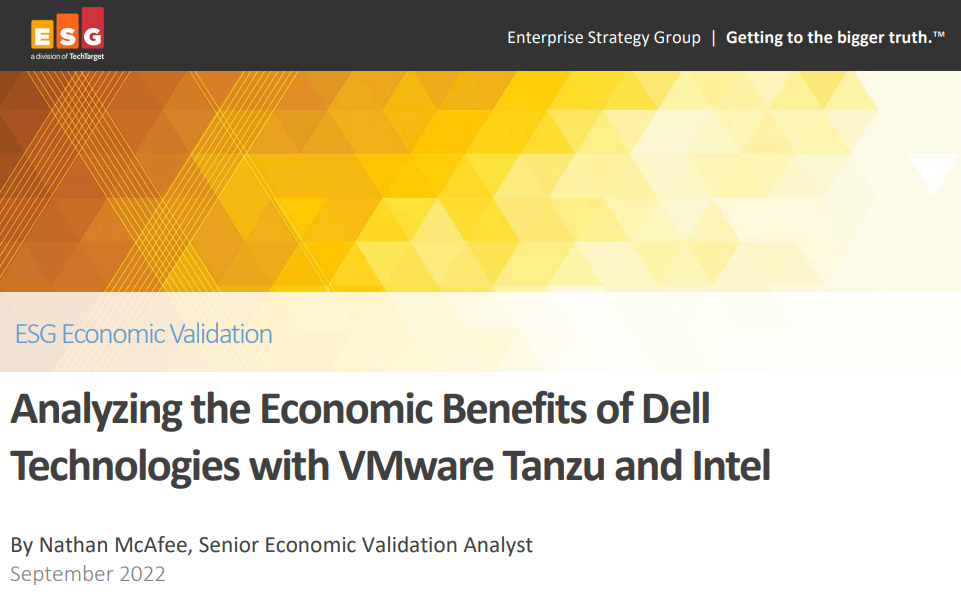 Analyzing the economic benefits of Dell Technologies with VMware Tanzu & Intel
Analyzing the economic benefits of Dell Technologies with VMware Tanzu & IntelWhitepaper ESG economic validation
By ITPro
-
 Defra needs £726 million to modernize pervasive legacy IT issues
Defra needs £726 million to modernize pervasive legacy IT issuesNews A significant portion of IT systems are reportedly still in extended support or are fully unsupported
By Ross Kelly
-
 Former TSB CIO fined £81,000 for botched IT migration
Former TSB CIO fined £81,000 for botched IT migrationNews It’s the first penalty imposed on an individual involved in the infamous migration project
By Ross Kelly